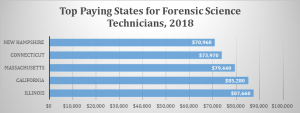Ever pondered the monetary compensation accrued by those who delve into the cryptic narratives etched within crime scenes? The allure of forensic science often conjures images of meticulous investigation, cutting-edge technology, and the relentless pursuit of truth. However, the pragmatic question of financial remuneration invariably surfaces. Dissecting the components that constitute a forensic scientist’s monthly income unveils a multifaceted landscape, influenced by experience, location, specialization, and a host of other variables.
The Variable Landscape of Forensic Scientist Salaries
Pinpointing a singular, universally applicable figure for a forensic scientist’s monthly salary proves to be an exercise in futility. The pay scale is not monolithic. Instead, it is a dynamic spectrum influenced by a confluence of factors. The level of education attained serves as a primary determinant. A neophyte entering the field with a baccalaureate degree can anticipate a significantly different starting salary compared to a seasoned veteran possessing a doctorate. Geographical location plays a pivotal role, as metropolitan areas with higher costs of living often command commensurately higher wages. Finally, the specific niche within forensic science occupied by the individual exerts a considerable influence. A DNA analyst, for instance, may command a different salary than a ballistics expert or a forensic toxicologist.
Deconstructing the Influential Factors
To grasp the nuances of forensic scientist compensation, a thorough examination of the key determinants is crucial. Let’s dissect the contributing elements that shape their monthly earnings:
- Education and Credentials: The attainment of advanced degrees, coupled with specialized certifications, often translates into a tangible increase in earning potential. The presence of a Master’s degree or a Ph.D. can significantly elevate one’s standing in the competitive job market and directly impact starting salary.
- Experience Matters: Time in the field correlates directly with proficiency and expertise. Seasoned forensic scientists, with years of practical application under their belts, are typically compensated at a higher rate than those just commencing their careers. The accumulation of experience validates their competence and bolsters their value within the organization.
- Location, Location, Location: The geographical location of the employment profoundly affects salary scales. Urban centers with higher living expenses and increased demand for forensic services tend to offer more lucrative compensation packages compared to their rural counterparts.
- Specialization: Forensic science encompasses a vast array of specializations, each requiring unique skill sets and training. Highly specialized roles, such as forensic pathology or digital forensics, may command premium salaries due to the scarcity of qualified professionals and the intricate nature of the work.
- Employer Type: The type of organization employing the forensic scientist can also impact their salary. Government agencies, academic institutions, and private forensic laboratories may adhere to different compensation structures, reflecting variations in funding models and operational priorities.
A Glimpse into Salary Ranges
While precise figures remain elusive, a circumspect assessment of available data can provide a general understanding of potential salary ranges. Entry-level positions, requiring minimal experience and a baccalaureate degree, might yield a monthly salary within a certain range. Mid-career professionals, boasting several years of experience and potentially advanced degrees, could expect a commensurate increase in earnings. Seasoned experts, commanding decades of experience and specialized certifications, often attain significantly higher compensation levels. Bear in mind, these are merely approximations, and individual circumstances may lead to deviations from these benchmarks.
Beyond the Base Salary: Benefits and Perquisites
It is crucial to recognize that the base salary constitutes only one component of the overall compensation package. Forensic scientists frequently enjoy a range of benefits and perquisites that augment their total remuneration. Health insurance, retirement plans, paid time off, and professional development opportunities can substantially enhance the overall value proposition of a forensic science career. Furthermore, some positions may offer additional incentives, such as performance-based bonuses or stipends for specialized training.
The Investment in a Rewarding Profession
Embarking on a career in forensic science represents a significant investment of time, effort, and financial resources. The pursuit of higher education, specialized training, and ongoing professional development necessitates a sustained commitment to lifelong learning. While the financial rewards may not always be immediately apparent, the intrinsic satisfaction derived from contributing to the pursuit of justice and the resolution of complex investigations often outweighs purely monetary considerations. Forensic science offers a unique opportunity to apply scientific principles to real-world challenges, making it a profoundly rewarding and intellectually stimulating profession. The dedication to truth, combined with the pursuit of scientific accuracy, establishes the profound appeal of this critical domain.










Leave a Comment